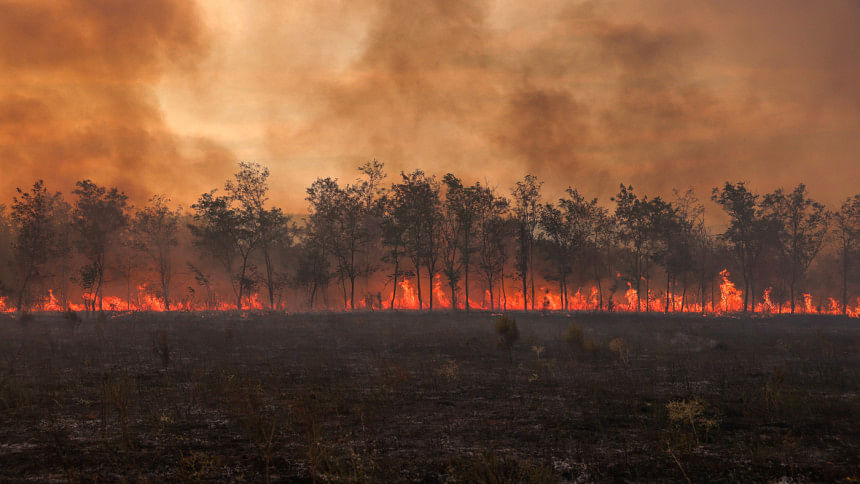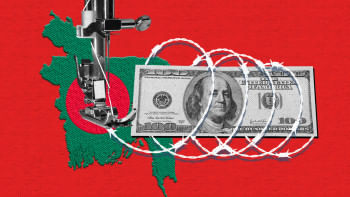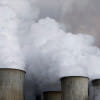Global trade war puts climate action under threat

President Trump's successive executive orders to increase tariffs since January 2025 have turned into a global trade war, particularly between the US and China. Average tariffs on Chinese goods now stand at more than 100 percent, while Chinese retaliatory measures on US exports to China exceed those of the US average. Additionally, the US has imposed more than 10 percent tariffs on almost all goods from most countries across the world. As China is now the leader of renewable energy and clean technologies, these tariffs will greatly impact its production and deployment, having serious impacts on climate change, an unfolding crisis of our time.
It may be mentioned that the US administration has again submitted its application to withdraw from the Paris Agreement. Domestically, the US is cutting back on its climate commitments, reducing the support for clean technology industries under the Inflation Reduction Act. So, how this new push back through escalating tariffs on clean technologies will affect climate diplomacy and actions is not yet very clear. But some likely trends can be discerned.
This unfolding tariff war is likely to stymie economic growth. An earlier report from the International Monetary Fund (IMF) shows that tariff increases are associated with a persistent decline in economic growth. This is likely to impact all sectors and priorities at national levels worldwide.
Tariffs on green goods, including Chinese exports of solar panels, electric vehicles (EVs) and batteries to the US, are likely to have both direct and indirect impacts globally. The retaliatory measures by China and the European Union (EU) could create space for Europe to attract low-carbon investment and lead in the energy transition. Continued support by European governments to provide public support for decarbonisation with cooperative trade partners will enable them to capitalise on the growing demand for renewable technologies globally. Against Trump's initiatives, China may redirect its exports toward the relatively open EU market, at a time when the group is trying to reduce its reliance on Russian energy sources for geo-political reasons.
As clean technology becomes costlier in the US, Chinese companies will likely gain a stronger position beyond the US markets. China's producers are likely to continue diversifying their markets. Exports of Chinese EVs and solar panels to Asia, Latin America and Africa have increased in recent years and will likely continue to expand in markets with lower barriers. This may be facilitated by other countries to attract foreign direct investment to develop a domestic production base in clean technologies.
The US imports solar panels from other Asian countries, which are often produced by Chinese firms with components made in China. These companies are already responding to US restrictions by relocating parts of their production to new countries. This has been most visible in the solar industry, where value chains shifted to countries in Southeast Asia to avoid US tariffs and restrictions. Now it is to be seen how the Trump administration can enforce stricter "rules of origin (ROOs)" for countries it thinks may facilitate transshipment of Chinese goods or for goods made with Chinese components.
Increased tariffs by 25 percent on Canadian and Mexican steel and aluminium exports are likely to weaken the ability of US automakers to transition to EVs. This will benefit Chinese EV makers, with their innovations and low cost. So Chinese companies will likely gain a stronger footing globally.
Media reports suggest that the oil and gas lobbying groups around the world are already active in using this opportunity for more oil and gas production. Developing countries will face increasing pressure from tariffs, their debt burden will keep mounting, so they will be forced to relax environmental standards to maintain competitiveness in external trade.
As predicted and analysed by the Sixth Assessment Report (AR6) of the United Nations (UN) Intergovernmental Panel on Climate Change (IPCC), trade protectionism goes against ambitious climate action. AR6 has developed, among others, a global scenario of regional rivalry, called the Shared Socioeconomic Pathways-3 (SSP3), where scientists concluded that under a scenario of rivalry and non-cooperation, challenges to mitigation and adaptation would be high, rendering the goal under the Paris Agreement of limiting the temperature rise to 1.5 degrees Celsius unrealisable. This scenario could lead to four times more emissions than a sustainability-focused pathway with low challenges to mitigation and adaptation. Reducing emissions will be more expensive, as investments needed to scale clean technologies will plummet. As a result, these technologies fail to penetrate the markets that need them most.
Adaptation as well will meet challenges under this SSP3 scenario, as this will promote deforestation and the intensification of cropping. Extensive deforestation and agricultural expansion would reduce ecosystem services and biodiversity, reducing their adaptive capacity. This area is likely to be a priority agenda at COP30 in Belem, Brazil, in November 2025.
We may recall that to prevent a rise in protectionism among countries, the General Agreement on Tariffs and Trade (GATT) was established in 1947, which eventually led to the creation of the World Trade Organization in 1995. The WTO ensures a system of rules-based international trade with checks for discriminatory trade practices and barriers. Now, the unfolding unilateralism in the form of only bilateral deals among countries is likely to seriously undermine multilateralism in the global trading system.
Finally, it may be argued that Trump's tariff policies are likely to harm the US more than others, with higher inflation, joblessness and even a potential recession. This is likely to further strengthen China's leadership in the global green technology supply chain. The trade war could slow the global clean energy transition, at a time when it is the need of the day. China, the world's largest emitter, is also the clean technology leader, with record deployment of renewables and EVs. Consequently, the country's progress on its emission and environmental targets has implications for global trade, investments and the global energy transition.
Mizan R Khan is technical lead at LDC Universities Consortium on Climate Change (LUCCC).
Views expressed in this article are the authors' own.
Follow The Daily Star Opinion on Facebook for the latest opinions, commentaries and analyses by experts and professionals. To contribute your article or letter to The Daily Star Opinion, see our guidelines for submission.

 For all latest news, follow The Daily Star's Google News channel.
For all latest news, follow The Daily Star's Google News channel. 










Comments